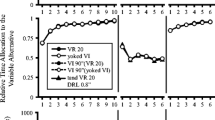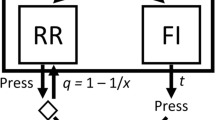Abstract
Four male subjects responded on a multiple schedule in which responding was maintained by a random interval 20-sec (RI20) schedule of point presentation. Responding was suppressed in alternating components by an added variable ratio 30 (VR30) schedule of point subtractions. Each component was accompanied by distinctive stimulus lights. Subjects were exposed to the multiple schedule from the initial session. Two subjects experienced four 50-min sessions daily (Experiment 1) and the other two subjects participated in one 50-min session daily (Experiment 2). Once responding in the punished components had stabilized, responding in the nonpunished components continued to increase across sessions. Nonpunished responding did not stabilize even after as many as 36 sessions. These results are discussed in the context of previous studies using animals which employed multiple schedules with punished and nonpunished response contingencies.
Similar content being viewed by others
References
AZRIN, N. H. (1956). Some effects of two intermittent schedules of immediate and non-immediate punishment. The Journal of Psychology, 42, 3–21.
BRETHOWER, D. M., & REYNOLDS, G. S. (1962). A facilitate effect of punishment on unpunished behavior. Journal of the Experimental Analysis of Behavior, 5, 191–199.
CHAIT, L. D., WENGER, G. R., & MCMILLAN, D. E. (1981). Effects of phencyclidine and ketamine on punished and unpunished responding by pigeons. Pharmacology Biochemistry and Behavior, 15, 145–148.
DUREL, L. A., KRANTZ, D. S., & BARRETT, J. E. (1986). The antianxiety effect of betablockers on punished responding. Pharmacology Biochemistry and Behavior, 25, 371–374.
FANTINO, E., & LOGAN, C. A. (1979). The experimental analysis of behavior: A biological perspective. San Francisco: W. H. Freeman.
FERSTER, C. B., & SKINNER, B. F. (1957). Schedules of reinforcement. New York: Appleton-Century-Crofts.
GELLER, I., & SEIFTER, J. (1960). The effects of meprobamate, barbituates, d-amphetamine, and promazine on experimentally induced conflict in the rat. Psychopharmacologia, 1, 482–492.
REYNOLDS, G. S. (1961). Behavioral contrast. Journal of the Experimental Analysis of Behavior, 4, 57–71.
SANGER, D. J., & BLACKMAN, D. E. (1978). A variable-interval punishment procedure for assessing anxiolytic effects of drugs. Psychological Reports, 42, 151–156.
SCHWARTZ, B., & GAMZU, E. (1977). Pavlovian control of operant behavior. In W. K. Honig & J. E. R. Staddon (Eds.), Handbook of operant behavior (pp. 53–97). Englewood Cliffs, NJ: Prentice-Hall.
WITKIN, J. M., & BARRETT, J. E. (1981). Effects of pentobarbital on punished behavior: Persistent increases with chronic administration. Psychopharmacology, 75, 324–325.
Author information
Authors and Affiliations
Additional information
This research was supported by USPHS Grant DA 04044. The authors thank Paul Prasco and Ben Stratton for technical assistance in collection of the data. The authors also thank Richard A. Meisch, Greg Lemaire, and Ralph Spiga for their comments on earlier drafts of the manuscript.
Rights and permissions
About this article
Cite this article
Bennett, R.H., Cherek, D.R. Punished and Nonpunished Responding in A Multiple Schedule in Humans: A Brief Report. Psychol Rec 40, 187–196 (1990). https://doi.org/10.1007/BF03399557
Published:
Issue Date:
DOI: https://doi.org/10.1007/BF03399557




